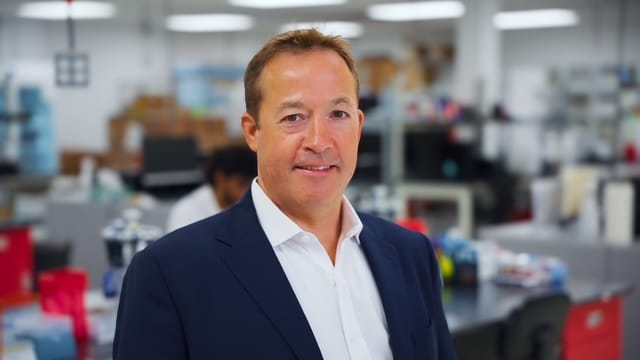FMCA graduate Hiva Monshi blends the fast-paced world of tech with the science of functional medicine and behavior change. A biomedical engineer by training and a Salesforce solution architect by profession, Hiva’s journey into health coaching began not through a personal health crisis, but through curiosity and a corporate wellness pilot program that introduced her to FMCA.
While participating in an employee well-being initiative, Hiva was exposed to the FMCA approach for the first time. It instantly resonated with her lifelong instincts about mind-body connection, root-cause health, and the power of lifestyle.
“This journey started with my own healing. I wasn’t even sure if I was going to make a business out of it. But I think that’s what makes me resonate with other people… because I’m a human too. And I’ve been through this. And now I’m able to help people.”
Hiva Monshi, FMCA Graduate
Today, Hiva works part-time as a health coach supporting high-performing women in tech who are navigating chronic stress, burnout, and the challenge of balancing fast-paced careers with their health. Drawing from her own experience in high-pressure work environments, she helps clients reconnect with their bodies, create personalized wellness plans, and build healthier habits that feel sustainable.
At FMCA, Hiva found both a knowledge-rich curriculum and a deeply supportive community. Tools like motivational interviewing and positive psychology gave her practical skills to guide clients with compassion and structure. Group coaching sessions, continued alumni education, and peer support networks also played a huge role in helping her overcome imposter syndrome and launch her practice with confidence. Though she continues to work full-time in tech, Hiva is planting the seeds of change within her industry and already sees others taking interest. Her message for anyone considering FMCA, especially those in high-pressure fields like tech? Trust your instincts.
Watch the Interview
Watch the full FMCA Alumni interview with Hiva to learn more about her inspiring journey:

Hiva Monshi is a National Board-Certified Health & Wellness Coach with a background in biomedical engineering, functional medicine, and over a decade in tech consulting. She helps individuals create sustainable habits, reconnect with their bodies, and bring balance to their lives through trauma-informed, science-backed coaching. Hiva supports clients navigating stress, mental health challenges, and health transitions with empathy, clarity, and practical tools.
Transcript
Natalie: Hello, everyone. My name is Natalie. I’m on the marketing team here at FMCA. And I’m very excited today to be speaking with Hiva Monshi. She is part of the FMCA class of September 2023, and she graduated in September 2024. She is now a part-time practicing health coach and full-time tech professional. She combines her experience as a Salesforce solution architect with her background in biomedical engineering to support high-achieving professionals, especially those in tech, navigating mental health, stress, and burnout. And her approach is deeply personal, shaped by her own healing journey, and grounded in the science of behavior change. Thank you so much for being here with us today.
Hiva: Of course. Thank you for giving me this opportunity.
Natalie: Yes. So, I would love to go back to the beginning of your journey, and tell me what you were doing before becoming a student at FMCA. I know your career blends with that today still, but…
Hiva: Yeah. Yeah. As you mentioned, I’m a Salesforce solution architect. So, I work in the tech industry. I’ve been doing that for the past, gosh, 10, 11 years now. But my background is in biomedical engineering. So, I was always very passionate about, you know, our human physiology and biology, and how our different systems, and mind and body work together. That’s why, when I found the opportunity to dive into functional medicine, health coaching, I didn’t have to think for a second. You know, I just dove right into it. And I’m so happy that I did it.
Natalie: So, what did bring you into functional medicine and ultimately health coaching?
Hiva: Yeah. It’s actually interesting because I came to know about FMCA through my work. We were doing an experiment about employee health, well-being. And so, a select number of employees were given opportunity to work with coaches from FMCA. And that’s how I came to learn about functional medicine. Like, I knew there is something more to the conventional medicine that we had. That’s something that I was trying to, like, instinctively follow in my…throughout my life. I just didn’t have a word for it, didn’t know the correct terminology until I came across FMCA in that experiment we were doing at work. And I was so excited to learn about it.
And, you know, it was…it definitely changed my lifestyle. It really helped me. And when I received the email from FMCA saying that they’re going to start a cohort and that, you know, if I’m interested, that, you know, I can jump on this call. So, I went to the call. I looked at the material, the curriculum, and I was just so excited. Right away, I knew this is what I wanted to do. It just aligned with every single thing that I believed in throughout my life, and that I wanted to follow. So, it was perfect match, perfect timing.
Natalie: That’s amazing. I love how you say that you knew there was another way, but you didn’t know what the terminology was or what it was really called. I think a lot of people would resonate with that, that they know that there’s this functional medicine approach out there, but they don’t know that it’s called the functional medicine or, you know, all of the different positive psychology and everything that goes into FMCA’s curriculum. So, that’s really, really cool. So, how are you using your health coaching certification and making an impact on the health and wellness of your clients and community today?
Hiva: Yeah. I’ve had numerous clients that I’ve been working with, especially in the tech industry, because I resonate really well with them. I know it’s very difficult to maintain that work-life balance, you know. It’s a very highly speed and very stressful environment that I have been in for so many years. And so, it’s easier for me to connect with people. And with the help of everything that I’ve learned at FMCA and beyond that, I’m able to bring that, you know, shift in the way you look at your life and your lifestyle to my clients, and help them, you know, be more in touch with who they are, especially women, you know. Because I read a lot about the fact that, you know, women’s biology is very different than men. We’re not built to work in a really fast-paced, full of stress environment than men do, but a lot of us are there these days.
And so, I think we all need help to kind of be able to orient and come back to our bodies, and make sure that we’re focusing on our health as well, because we’re also caregivers. A lot of us are mothers, you know. So, it’s like our responsibilities don’t just end at work. And, you know, by the time that the workday ends, it extends beyond that. So, it’s very important to, you know, have that healthy lifestyle, and also be that model to our kids or to those around us.
So, that’s how I help my clients, you know, helping them understand, you know, the reasoning behind why their lifestyle is how it is today, and what are the ways they can do to…you know, what are the things they can change to make it better, to make it, you know, healthier to achieve the goals that they want? And, obviously, it’s not going to be the same for everyone. So, I think it’s very important to be able to listen to individuals, and to help them find their own strength inside, and see what’s worked for them. So, something very personalized to their approach and to their lifestyle, what…you know, the resources that they have available to them.
Natalie: That’s amazing. Yeah. It’s very beautiful how you describe that as females, especially, the society that we’re in, you know, we don’t run a 24-hour cycle the way that men do. So, it’s really important to listen to our body, and figure out how we can use our tools, and understand how our body works to best live in the system that we are in. So, I want now to shift back towards your time at FMCA. And if you could tell me a little bit more about your experience as an FMCA student, and what you enjoyed about the program.
Hiva: Yeah. I don’t know if there’s anything specific that I can point because there were so many different things that I really enjoyed. We had a really great instructor. She was full of knowledge. She was full of compassion. And I think that really allowed the people in my cohort, you know, to practice that compassion amongst ourselves. We’re still in touch. You know, after it’s almost, I would say, a year after we’ve graduated, we still try to, you know, connect, if not bi-weekly, at least once a month to catch up. We do have a group chat where we keep in touch with each other, we encourage each other, you know, exchange any new information that we come across.
And so, there has been a lot of, you know, nice moments like that, a lot of, you know, collaboration. We had these amazing coaching sessions that we did amongst ourselves during the class. And, you know, just the feedback that everyone provided, I feel like everyone was so compassionate. At the same time, they had your best interest in mind, you know, making sure that they are providing a feedback that is really to your benefit, that helps you improve. And so, it was a lot of, you know, learning and growing together, and a community that I think is gonna be here for years and years to come. It was really great. And just, like, all the resources that was available to us, you know, it was a great experience for me, and I know, like, for the people who were in my cohort.
Natalie: Thank you for sharing that. And how did FMCA prepare you to be a successful health coach? Are there any specific tools that you learned, or parts of the education or curriculum that you want to highlight?
Hiva: Mm-hmm. I would say, definitely different techniques, like motivational interviewing, positive psychology, different ways of, you know, dealing with people, that was definitely very helpful, things that were new to me, you know. I didn’t know about them before. I think those tools were really great. Just learning more about, you know, biology and physiology, and even our psychology.
Coming from biomedical background, I did a great deal of studying in, like, physiology and biology, but, like, going…looking at it from a functional medicine perspective, I would say, is different. And that’s something that really interested me because I feel like it’s something that you don’t really come across. You know, it’s not very common to come across it. Like, when you go to a conventional doctor, they don’t look at these things. So, I think it’s very important to go into those root causes. And then, like, the tools they provide you, different…I don’t know, different diets, different tools to just get to know yourself, your own strengths, your own values. I think these are very valuable information that was provided, and that is very useful, you know, when I talk with my clients, when I have sessions with my clients.
And I also came to know about a lot of different people who are, you know, well-known in functional medicine. So, I follow them on social media. I keep learning from them, which is amazing. And I feel like there’s definitely a lot of…like, a wealth of knowledge that is very important, and that I still have access to. And I always go back to, you know, there’s a lot to learn, and it really excites me. And I’m very excited that I have that information to always go back to and to, you know, cross reference when needed.
Natalie: That’s great.
Hiva: I don’t know if I answered your question or not.
Natalie: Yes, you did. That was perfect. Yeah. Always learning something new, too. It doesn’t just end when you graduate. It’s ongoing.
Hiva: Yeah.
Natalie: So, now that you’re balancing your full-time career and your health coaching career, were there any fears or barriers about starting that health coaching career? And how did you overcome this?
Hiva: Mm-hmm. Of course, there’s fear in starting anything, you know. Imposter syndrome is there. You know, there’s a lot of unknown, you don’t know how things are going to work out. But I think, just taking actions is really important. And through the alumni program, I attended this course on how to, like, manage, run your own business, which gave us really good list of steps to things that we need to do. So, it kind of helped me orient myself and not be as overwhelmed as I used to be because I’m like, I don’t know where to start. You know, there’s so many things to do. I don’t even know what are all those steps. So, that course really helped me understand, okay, what are the things that I need? And so, I can work through them.
And, yes. Definitely, that fear was there, but I was able to find some…a couple of people who were willing to, you know, keep me accountable…or we did that amongst ourselves. They were part of that course as well. So, we were able to, like, take small steps. You know, every time we met, we were providing updates to each other. We were, like, finding out information about, okay, this can be done this way, or this is what we need to do next. And that was very helpful, you know, just having that accountability, especially from someone who is going through the same journey as you are. So, they know, you know, they’re going through the same stress, they’re going through the same uncertainty. It was definitely very helpful to have that support.
Natalie: Mm-hmm. Yeah. That’s one of the best parts about the alumni program, I think, is that course that’s kind of a roadmap to help you launch your business, because a lot of people join FMCA and want to be a health coach. And they think, oh, it’s just about coaching people, but you actually have to know the business side of things, too. It’s really important to make sure you have a full understanding, but then having that community to do it alongside is really great.
Hiva: Yeah.
Natalie: All right. So, at FMCA, we say that you’re an FMCA graduate for life. And what does the ongoing alumni connection and support look like for you? I know you spoke a lot about your cohort and that you’re still in contact with one another, supporting each other. Is there anything else you wanted to add to that?
Hiva: Mm-hmm. Yeah. I’ve been part of the alumni. Unfortunately, I’m not able to attend all the sessions because it’s complex, like, some of the meetings I have with my day job. But the ones that I’ve been able to attend, they have been very nice. You know, you’re always learning more, people bring in their experiences, they ask their questions. So, it makes you think, and you’re like, oh, well, now, I know if I’m in the same situation, what to…like, what I can do. And constantly making new connections as well from different cohorts that I haven’t been in. And it’s just nice, you know, also to hear about how people are moving forward, how they’re progressing in their own businesses, you know, just learning from each other. It’s definitely something that I really cherish and I’m happy that I’m a part of.
Natalie: That’s great. So, I love all of what you’ve shared. Would you now be able to share some advice that you would give to somebody who might be considering embarking on the journey to becoming a functional medicine certified health coach?
Hiva: Yeah. I mean, definitely, I would say, with anything, listen to your gut. See what your gut tells you. That’s how I got here. I knew it deep inside that I was so excited about everything that FMCA was offering, like, all the courses. And I knew this is what I wanted. So, definitely, trust your gut because that’s also what functional medicine is about. Your mind and body definitely can direct you. But know that, you know, you’re going to get access to the most amazing, you know, people who are in the functional medicine. You know, Deanna Minich, Dr. Mark Hyman, a lot of amazing people in this area. I think it’s a very high-quality course. So, I would definitely recommend it. And I would say that I know, like, there’s you, there are so many other people who are more than happy to guide people to talk through them, answer any questions they have. If you have any doubt or if you don’t know whether…like, if you haven’t made up your mind yet, there are definitely people there who are going to help you, you know, make the decision that’s best for you.
Natalie: Mm-hmm. That’s great. And is there anything else that you’d like to add, specifically for someone in the tech space that might be considering it?
Hiva: Yeah. I would say, I’m seeing…I’m kind of seeing the shift. Like, I know a few people even at my work, who have set up time on my calendar. They’re interested. They’re like, this is amazing, we want to go this path. So, I still have to talk to them. But I know, the more we…I guess, the more time passes, the more people become aware of, you know, how important their health is. And I think, with the rise in AI and everything, it’s even becoming more crucial to be able to create a lifestyle that still is manageable, and that still connects your mind and body together. So, I think it’s important. For me, I wanted to start this for my own healing journey. I wasn’t even sure if I was going to make a business out of it. But I think that that’s what makes me resonate with other people as well, because I’m a human, too. And I’ve been through this. And now, I’m able to help people. So, definitely, if it’s something that you’re interested in, I would encourage people. It’s a beautiful area that you can be involved with. And I think we need more and more coaches.
Natalie: Beautiful. Thank you. Thank you so much for sharing your story with me today. And I know it will go on to inspire so many people just like you that are, you know, beginning their journey, and want to dabble in or learn more about what a functional medicine health coach does, what they do, and the entire industry and landscape. So, thank you so much, again.
Hiva: Of course. Thank you for giving me this space.
Our Latest Blogs
-

Would You Be a Good Health Coach?
Read Full Article: Would You Be a Good Health Coach? -

Food Sensitivity Testing 101: Supporting Clients with Inflammation and Gut Issues
Read Full Article: Food Sensitivity Testing 101: Supporting Clients with Inflammation and Gut Issues -

Protein 101: The Health Coach’s Guide
Read Full Article: Protein 101: The Health Coach’s Guide

